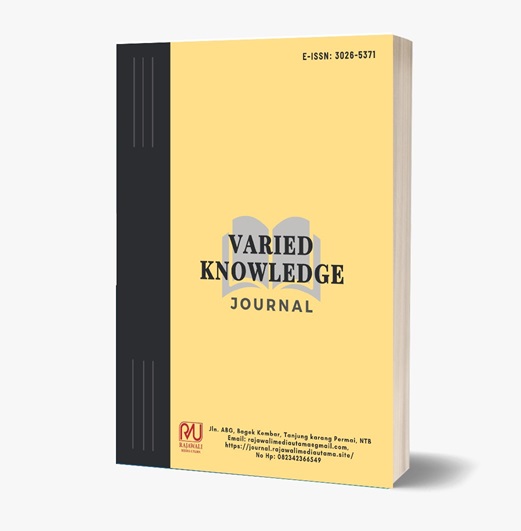Analisis Kemampuan Siswa pada Penilaian Sumatif Mata Pelajaran Kewarganegaraan
DOI:
https://doi.org/10.64070/vkj.v1i4.20Keywords:
Student Ability Analysis, Summative Assessment, Civic EducationAbstract
This study aims to analyze the skills of students in the end-of-semester assessment in the subject of Civic Education (PKN). The research method applied is quantitative descriptive research using data from the odd semester exam results for the 2023/2024 school year as the material for analysis. The research sample consisted of 31 fourth grade elementary school students in Jayapura city. Data was collected through document analysis and direct observation of the assessment process. The results showed that 78% of the learners achieved good assessment. Factors that influenced learners' skills included teaching methods, learning environment support, and learners' interest in the subject. The implications of the findings emphasize the importance of developing inclusive and adaptive evaluation strategies, as well as improving the effectiveness of teaching methods to ensure optimal learning achievement in Civics.
References
Ardana, L. N., Vega, N., Kirana, P., & Sunaryati, T. (2023). Peran penting evaluasi pembelajaran pada mata pelajaran pendidikan kewarganegaraan di sekolah dasar berbasis pendidikan karakter. Jurnal Pendidikan Tambusai, 7(2), 15814–15819. https://doi.org/10.31004/jptam.v7i2.8871
Ardiansyah, Risnita, & Jailani, M. S. (2023). Teknik pengumpulan data dan instrumen penelitian ilmiah pendidikan pada pendekatan kualitatif dan kuantitatif. Jurnal IHSAN: Jurnal Pendidikan Islam, 1(2), 1–9. https://doi.org/10.61104/ihsan.v1i2.57
Bae, Y., & Han, S. (2019). Academic engagement and learning outcomes of the student experience in the research university: Construct validation of the instrument. Educational Sciences: Theory and Practice, 19(3), 49–64. https://doi.org/10.12738/estp.2019.3.004
Cushing, D. F., Pennings, M., Willox, D., Gomez, R., Dyson, C., & Coombs, C. (2019). Measuring intangible outcomes can be problematic: The challenge of assessing learning during international short-term study experiences. Active Learning in Higher Education, 20(3), 203–217. https://doi.org/10.1177/1469787417732259
Deti, S., Firdaus, A. R., Oktari, D., & Prihantini. (2024). Perspektif guru sekolah dasar terhadap tantangan penilaian kurikulum merdeka dan kurikulum 2013. Jurnal Pendidikan Tambusai, 8(1), 1852–1859. https://doi.org/10.31004/jptam.v8i1.12661
Fauth, F., & González-Martínez, J. (2021). On the concept of learning transfer for continuous and online training: A literature review. Education Sciences, 11(3). https://doi.org/10.3390/educsci11030133
Gerritsen-van Leeuwenkamp, K. J., Joosten-ten Brinke, D., & Kester, L. (2019). Students’ perceptions of assessment quality related to their learning approaches and learning outcomes. Studies in Educational Evaluation, 63, 72–82. https://doi.org/10.1016/j.stueduc.2019.07.005
Ghanad, A. (2023). An overview of quantitative research methods. International Journal of Multidisciplinary Research and Analysis, 06(08), 3794–3803. https://doi.org/10.47191/ijmra/v6-i8-52
Goss, H. (2022). Student learning outcomes assessment in higher education and in academic libraries: A review of the literature. The Journal of Academic Librarianship, 48(2), 102485. https://doi.org/10.1016/j.acalib.2021.102485
Hartikainen, S., Rintala, H., Pylväs, L., & Nokelainen, P. (2019). The concept of active learning and the measurement of learning outcomes: A review of research in engineering higher education. Education Sciences, 9(4), 9–12. https://doi.org/10.3390/educsci9040276
Hofmann, R., Curran, S., & Dickens, S. (2021). Models and measures of learning outcomes for non-technical skills in simulation-based medical education: Findings from an integrated scoping review of research and content analysis of curricular learning objectives. Studies in Educational Evaluation, 71, 101093. https://doi.org/10.1016/j.stueduc.2021.101093
Kader, S. H. A., & David, S. A. (2024). Attitude and readiness of teachers to impart value education: Exploring teachers’ experiences and views from a private school in Sharjah. Journal of Studies in Social Sciences, 23(2), 1–30. https://www.infinitypress.info/index.php/jsss/article/view/2238
Kamaruddin, I., Suarni, E., Rambe, S., Sakti, B. P., Rachman, R. S., & Kurniadi, P. (2023). Penerapan model pembelajaran berbasis proyek dalam pendidikan: Tinjauan literatur. Jurnal Review Pendidikan Dan Pengajaran, 6(4), 2742–2747. https://doi.org/10.31004/jrpp.v6i4.22138
Ke, Z., Liu, B., Ma, N., Xu, H., & Shu, L. (2021). Achieving forgetting prevention and knowledge transfer in continual learning. Advances in Neural Information Processing Systems, 27(NeurIPS), 22443–22456.
Magdalena, I., Hidayati, N., Dewi, R. H., Septiara, S. W., & Maulida, Z. (2023). Pentingnya evaluasi dalam proses pembelajaran dan akibat memanipulasinya. MASALIQ: Jurnal Pendidikan Dan Sains, 3(5), 810–823. https://doi.org/10.58578/masaliq.v3i5.1379
Mustaqim, D. Al. (2023). Peran pendidikan profesi guru untuk meningkatkan profesionalitas dan kualitas pembelajaran di Indonesia. Literasi: Jurnal Manajemen Pendidikan, 1(2), 168–176. https://doi.org/10.1111/literaksi.v1i02.224
Nasution, F., Wulandari, R., Anum, L., & Ridwan, A. (2023). Variasi individual dalam pendidikan. Jurnal Edukasi Nonformal, 4(1), 146–156. https://ummaspul.e-journal.id/JENFOL/article/view/5797
Prasetia, I. (2022). Metodologi penelitian pendekatan teori dan praktik (I). Umsu Press.
Quintão, C., Andrade, P., & Almeida, F. (2020). How to improve the validity and reliability of a case study approach. Journal of Interdisciplinary Studies in Education, 9(2), 264–275. https://doi.org/10.32674/jise.v9i2.2026
Ridwan, M., Syukri, A., & Badarussyamsi, B. (2021). Studi analisis tentang makna pengetahuan dan ilmu pengetahuan serta jenis dan sumbernya. Jurnal Geuthèë: Penelitian Multidisiplin, 4(1), 31. https://doi.org/10.52626/jg.v4i1.96
Saputra, A. M. A., Tawil, M. R., Hartutik, H., Nazmi, R., La Abute, E., Husnita, L., Nurbayani, N., Sarbaitinil, S., & Haluti, F. (2023). Pendidikan karakter di era milenial: Membangun generasi unggul dengan nilai-nilai positif. PT. Sonpedia Publishing Indonesia.
Wisman, Y., Effrata, E., & Tutesa, T. (2021). Penerapan konsep instrumen evaluasi hasil belajar. Jurnal Ilmiah Kanderang Tingang, 12(1), 1–9. https://doi.org/10.37304/jikt.v12i1.105
Yuhana, A. N., & Aminy, F. A. (2019). Optimalisasi peran guru pendidikan agama Islam sebagai konselor dalam mengatasi masalah belajar siswa. Jurnal Penelitian Pendidikan Islam, 7(1), 80–96. https://doi.org/10.36667/jppi.v7i1.357
Zaini, A. (2023). Harmonisasi nilai-nilai Pancasila dan agama dalam membentuk karakter. SALIMIYA: Jurnal Studi Ilmu Keagamaan Islam, 4(3), 122–138. https://ejournal.iaifa.ac.id/index.php/salimiya/article/view/1250















